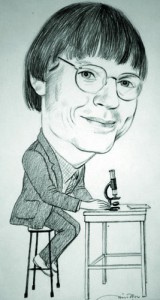General Practitioner
Sussex, United Kingdom
Tuesday, March 29th, 2011

We all want to be remembered for something – a major contribution to science, or a political triumph bringing peace to a beleaguered world, or perhaps you would like to be honoured with an eponymous syndrome? Or, more modestly, as one committed housewife said, “I would like simply to be remembered for making good gravy.” She held on to this humble desire until it was pointed out to her by some wit, that such a wish was really taking cannibalism too far. So what do we boil down to? If not exactly gravy, then perhaps a juicy bundle of conflicting desires encased in a will for pleasure. No philosopher, artist or scientist has been able to come up with a better reason for doing something than pleasure (giving it, and receiving it).
A world without pleasure is pointless. We may sense this pointlessness on a bad day as we go out to work, fighting stolidly to save impossible lives. But if we accord taking pleasure in our patients as a primary aim, all may not be lost. Of course we know that patients’ welfare and the relief of suffering should be our first concern. But this wears thin after a decade or two (or a week or two) at unpromising bedsides. Pleasure is the only motivator that lasts a professional lifetime. Like it or not, there is no alternative to pleasure. Just as the sex therapist must “give permission” to inhibited clients to enable them to partake of the full range of sexual pleasures, so medical authors have to give permission to fellow doctors to sample clinical pleasures. We are so conditioned by our objective scientific training that we tend to put pleasure last in the list of tasks we must accomplish – if it ever gets onto the list at all.
So what are the pleasures we are talking about? I was once told by a connoisseur, who happens to be a judge, that all pleasures are sensory (as he refilled my glass with a sumptuous wine). So “enjoying our patients” does sound rather cannibalistic in this context. While we do not exactly endorse this approach, it reminds us that swallowing is the vital precursor of many pleasures. And in the clinical context, this means swallowing the whole patient – hook, line and sinker. For those who do not fish, it may be necessary to point out that the sinker is…
